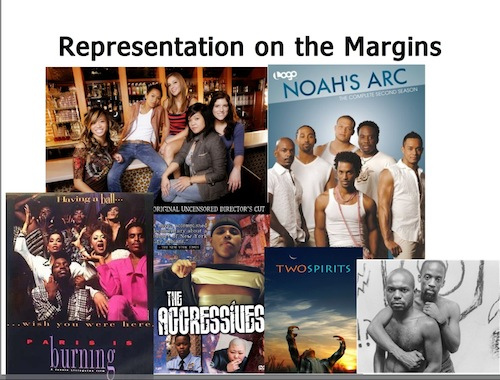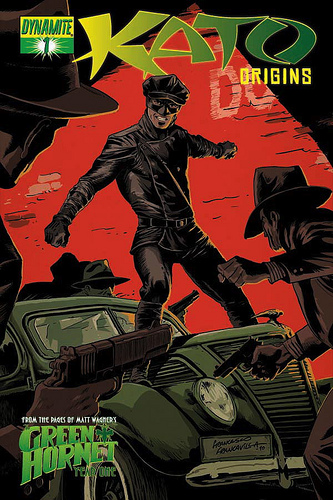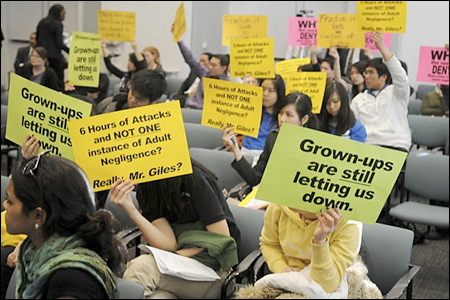links for 2010-03-25
-
"'Quest for Length' was accepted into Sundance, and was dubbed one of the year's best comedy shorts by American Cinematheque. It also launched Fan's acting career, although he notes that in Hollywood, he's what's known as a 'hard cast.'
"'If you just look at my description, I come off as an all-American leading guy,' he says. 'But if you turn on the TV or go to the movies, you don't see Asian actors playing all-American leading guys.'
"And the mini-member caricature may be part of the reason why. It's hard to make a romantic lead seem believably virile and sexy when the full force of centuries of pop culture suggests that, uh, his iPod is a Nano."
-
"Reynaga is General Secretary of the Latin American and Caribbean Sex Workers Network (RedTraSex) and I met her when she was in Europe at the invitation of the International HIV/Aids Alliance and anticipating a meeting with the Global Fund to Fight Aids, Tuberculosis and Malaria. She is taking the argument to the Fund. It is of little use giving condoms and HIV prevention advice to women who are harrassed by the police and abused and cheated by their clients because of their illegitimacy, she says. If you want sex workers to negotiate with their clients, you have to give them status. They have to have some rights."
-
"Campus police arrived and took Foster to the ground when she refused to leave the classroom. Foster now faces a charge of disorderly conduct. A witness told WTMJ radio that before calling police, Foley Winkler gave Foster "four or five chances" to leave the classroom on her own."
-
"In the first episode, set in Thailand, however, we're treated to a disappointing abundance of American cultural voyeurism. Simpson squeals after trying to eat fried insects and giggles in a Buddhist temple. She visits the Kayan tribe, whose women wear gold rings that elongate their necks. For a dose of seriousness, she meets a woman whose skin has been disfigured from bleach creams. To Simpson, for whom time spent under the tanning lamp is a normal everyday thing, the idea that women in other cultures would want to lighten their skin is a revelation (to anyone who has even glancingly looked into the effects of racism on beauty standards, not so much)."
-
"While Sikhs used to serve in the Army while observing their religion's requirements for wearing turbans and not shaving their hair and beards, the Army eliminated the exemption in 1984.
Until now. After much advocacy from the Sikh community, the Army relented for Rattan and for a fellow Sikh who will be trained as a medic this summer. "
-
"Dr. Ghavami has written textbook chapters and professional essays on the difference between 'ethnic' rhinoplasties and the 'regular' nose job, and is considered an expert in the field.
"The key is to recognize the ethnic features that make that person unique and not create a nose that is 'cookie cutter' and Westernized. For the past 30 years, there have been nasal proportion and guidelines that have been taught to plastic surgeons, but this approach in ethnic patients may create what I call 'racial incongruity. I'm sure you can think of multiple examples among African-American celebrities who have noses that don't fit with the rest of their ethnic features. There are special techniques of using suture shaping along with cartilage grafting to create ethnically balanced noses," says Dr. Ghavami."

 We are late on picking up the story of Nazia Quazi, a Canadian woman being held against her will in Saudi Arabia.
We are late on picking up the story of Nazia Quazi, a Canadian woman being held against her will in Saudi Arabia.
 That said, the two-part “Revelation Zero” gets points for at least trying to seem important, as the creative team busted out seemingly every narrative trick at its’ disposal and brought in more characters to bolster its’ biggest revelation: that the man we’d come to identify as Suspect Zero was in fact
That said, the two-part “Revelation Zero” gets points for at least trying to seem important, as the creative team busted out seemingly every narrative trick at its’ disposal and brought in more characters to bolster its’ biggest revelation: that the man we’d come to identify as Suspect Zero was in fact  Please note, this is part five of a multi-part series on the
Please note, this is part five of a multi-part series on the  Natalie Hopkinson over at the Root posted a
Natalie Hopkinson over at the Root posted a








 A lot of us working/breathing/organizing in feminist/humanist/womanist communities were running from event to event last week during
A lot of us working/breathing/organizing in feminist/humanist/womanist communities were running from event to event last week during  Carmen Van Kerckhove is co-founder and president of
Carmen Van Kerckhove is co-founder and president of